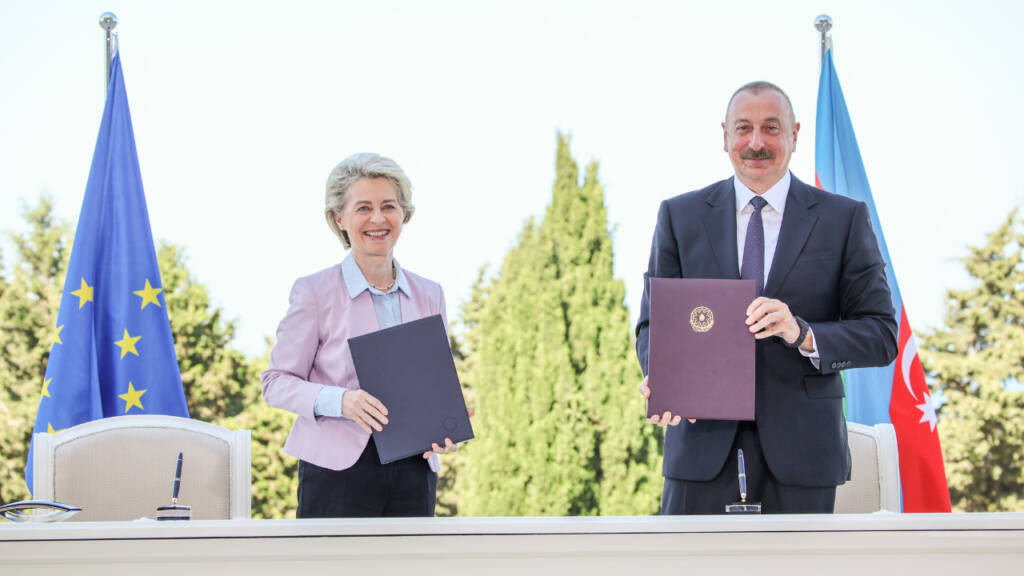Azerbaijan EU energy: Russia has long been a dominant player in Europe’s energy sector, and its gas exports to the continent account for a significant portion of Europe’s total gas consumption. The Russia-Ukraine crisis has given Moscow an opportunity to tighten its grip on Europe’s energy market by using gas supplies as a political tool.
Russia has a history of using its gas exports as a weapon to exert political pressure on Europe. In 2009, Russia cut off gas supplies to Ukraine, which also affected the flow of gas to Europe, causing widespread energy shortages and price spikes. The incident demonstrated Russia’s ability to use its energy exports as a political tool to gain leverage over Europe.
Europe’s increasing reliance on gas imports from Russia has also raised concerns about the continent’s energy security. The European Union has been working to diversify its energy supplies and reduce its dependence on Russian gas, but the recent events in Ukraine have made this task more challenging.
The ongoing Russia-Ukraine crisis has created significant turmoil in Europe’s energy supplies, forcing the continent to seek alternative sources of oil and gas to meet its energy demands. The conflict between the two countries has resulted in the disruption of gas pipelines that pass through Ukraine and were crucial transit routes for gas supplies from Russia to Europe.
The situation has forced Europe to explore alternative energy sources, and one of the countries that have become the focus of attention is Azerbaijan. The country is strategically located and rich in oil and gas reserves, making it a significant player in the global energy market.
Azerbaijan was also seen as a promising alternative source of energy for Europe, with the construction of the Trans-Anatolian Pipeline (TANAP) and the Trans-Adriatic Pipeline (TAP) connecting Azerbaijan’s gas fields to Europe.
Read More: Green Is the New Black: The Dark Side of Ontario Development
More recently, President of the European Commission Ursula von der Leyen paid a high-level visit to Azerbaijan, crowned with the signing of a new gas export deal between the EU and Baku. The parties agreed upon expanding the volume of gas exports from Azerbaijan to Europe from last year’s level of 8 billion cubic metres (bcm) to around 20 bcm by 2027. However, this deal might soon face an existential threat.
But recently, Baku denounced Europe for meddling in its internal affairs.
In a speech last month, Azerbaijani President Ilham Aliyev blasted outside interference in his country’s standoff with Armenia over the contested region of Nagorno-Karabakh. “The mediators involved in the Karabakh conflict [try] not to solve the issue but to freeze it,” he declared, arguing Baku rejected efforts to “tire us out with meaningless negotiations.”
Baku is also reacting with fury after the European Parliament last month backed a report that “condemns the latest large-scale military aggression by Azerbaijan in September”.
Furthermore, Vaqif Sadıqov, the head of Azerbaijan’s mission to the EU, said that the presence of the monitors near the border with Azerbaijan is worrying Baku.
“This is a bilateral issue between Armenia and the EU, but it is happening a few hundred meters from our own border posts and in a heavily militarized environment where we have Russian border guards, Armenian border guards, Russian regular units, Armenian regular units and, closer to the Iranian border, Iran’s military. Now we also have EU peacekeepers. So we have legitimate security questions,” he said.
Make no mistake, for years, the EU has been vocal about human rights violations in Azerbaijan, including the persecution of journalists and political opponents. While these issues are certainly important, the EU’s approach is not necessarily the best way to address them. Azerbaijan is a sovereign nation, and the EU should respect its autonomy and work with the government to address these concerns in a constructive manner.
Read More: Canada could get thrown out of NATO
Furthermore, the EU’s approach risks damaging the relationship between Azerbaijan and the EU. Azerbaijan is an important energy partner for the EU, supplying natural gas and oil to several European countries. If the EU continues to interfere in Azerbaijan’s internal affairs, it risks damaging this important energy relationship.
Besides, the recent pushback by Azerbaijan’s could have Russian links. There is no reason not to believe that the threat by Azerbaijan’s authorities to European countries could be part of a broader strategy by Russia to further tighten its grip on Europe’s energy market.
Recently, Russian Foreign Minister Sergey Lavrov travelled to Baku to mark the one-year anniversary of an agreement aimed at cementing an “alliance” between Russia and Azerbaijan. It could not be a mere coincidence that voices of dissent against the EU in Azerbaijan started to gain traction immediately after the bilateral talks. As we may all be aware, Moscow has been working to expand its influence in the Caspian region, and Azerbaijan’s rift with the EU could be a sign of Moscow’s success in undermining Europe’s efforts in the region.
It is high time the EU accept that it should focus on its own strategic interests, rather than trying to impose its normative ideals on other countries. Overemphasis on human rights and democracy promotion has almost led to an end of crucial ties with Azerbaijan. This would only come back to haunt the EU in ways it may not have comprehended.
https://www.youtube.com/watch?v=SXDq25ZcXuM
